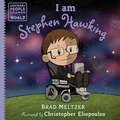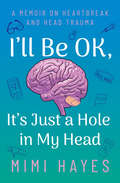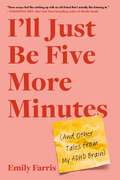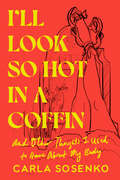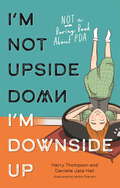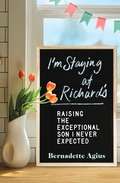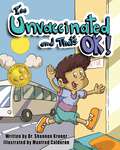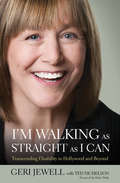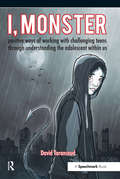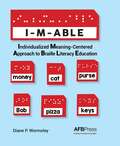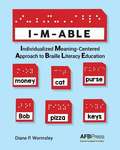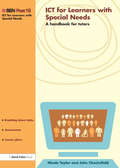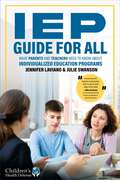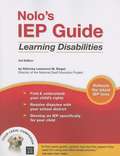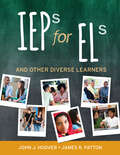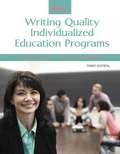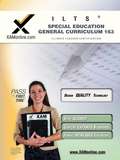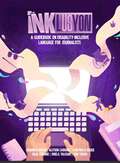- Table View
- List View
I am Stephen Hawking (Ordinary People Change the World)
by Brad MeltzerThe groundbreaking physicist and disability advocate is the 34th hero in this New York Times bestselling biography series for ages 5 to 9.From a young age, Stephen Hawking had a strong sense of wonder and was full of questions about the world around him and the stars above. He would spend his whole life trying to figure out how the universe worked, including discovering truths about black holes and energy. And when he was diagnosed with a rare disease called ALS that destroys the nerve cells in the body, he would find his own mental energy to carry on with his studies even after his limbs and vocal chords stopped working. He became one of history's most influential scientists. This friendly, fun biography series inspired the PBS Kids TV show Xavier Riddle and the Secret Museum. One great role model at a time, these books encourage kids to dream big.Included in each book are: A timeline of key events in the hero&’s history Photos that bring the story more fully to life Comic-book-style illustrations that are irresistibly adorableChildhood moments that influenced the hero Facts that make great conversation-starters A virtue this person embodies: Stephen Hawking's perseverance and ability to defy boundaries is highlighted.You&’ll want to collect each book in this dynamic, informative series!
I'll Be OK, It's Just A Hole In My Head: A Memoir On Heartbeak And Head Trauma
by Mimi HayesI'll Be OK, It's Just a Hole in My Head: A Memoir on Heartbreak and Head Trauma is a humorous and thoughtful cross between Jill Bolte Taylor's My Stroke of Insight and Jenny Lawson's Furiously Happy. Shocking and funny, Hayes' memoir shares the true story of a sudden brain hemorrhage at the age of twenty-two - and the heartache and strength that it took to overcome it. .
I'll Be OK, It's Just A Hole In My Head: A Memoir On Heartbeak And Head Trauma
by Mimi HayesI'll Be OK, It's Just a Hole in My Head: A Memoir on Heartbreak and Head Trauma is a humorous and thoughtful cross between Jill Bolte Taylor's My Stroke of Insight and Jenny Lawson's Furiously Happy. Shocking and funny, Hayes' memoir shares the true story of a sudden brain hemorrhage at the age of twenty-two - and the heartache and strength that it took to overcome it. .
I'll Just Be Five More Minutes: And Other Tales from My ADHD Brain
by Emily FarrisA hilariously-honest, heartwarming essay collection about life, love, and discovering you have ADHD at age 35 Despite being a published writer with a family, a gaggle of internet fans, and (most shockingly) a mortgage, Emily Farris could never get her sh*t together. As she saw it, disorganization was one of her countless character flaws—that is until she was diagnosed with ADHD at age 35. Like many girls who go undiagnosed, Emily grew up internalizing criticisms about her impulsivity and lack of follow-through. She held onto that shame as she tried (and often failed) to fit into a world designed for neurotypical brains. I'll Just Be Five More Minutes is a personal essay collection of laugh-out-loud-funny, tear-jerking, and at times cringey true stories of Emily's experiences as a neurodivergent woman. With the newfound knowledge of her ADHD, Emily candidly reexamines her complicated relationships (including one with a celebrity stalker), her money problems, the years she spent unknowingly self-medicating, and her hyperfixations (two words: decorative baskets). A memoir-in-essays both entertaining and enlightening, I'll Just Be Five More Minutes is for people with ADHD, as well as those who know and love them. This is a powerful collection of deeply relatable, wide-ranging stories about a woman's right to control her own body, about overwhelm and oversharing, about drinking too much and sleeping too little, and about being misunderstood by the people closest to you. At its heart, I&’ll Just Be Five More Minutes is about not quite fitting in and not really understanding why—something we&’ve all felt whether we're neurodivergent or not.
I'll Look So Hot in a Coffin: And Other Thoughts I Used to Have About My Body
by Carla SosenkoA &“raw, vulnerable, and utterly hilarious&” (Harper&’s Bazaar) memoir about one woman&’s experience living with a deformity, and her quest to find freedom and joy in her body &“Sosenko&’s experience with body shame and judgment, from herself and others, is universal. She shows us her journey from self-hatred to joy so that we may follow her lead.&”—Jo Piazza, bestselling author of The Sicilian Inheritance, podcast creator, and award-winning journalistCarla Sosenko was born with Klippel-Trenaunay syndrome, a rare vascular disorder that resulted in legs of different sizes, a mass of flesh on her back, a hunched posture, and other idiosyncrasies big and small. She spent years trying to hide under layers of clothing, and then experimented with the opposite: wearing tiny dresses and short shorts, daring people to stare so she could make them regret it. No matter what she did, she was worried that she didn&’t measure up.In this candid and funny memoir, Sosenko shares what existing in an unconventional body has meant for her self-image, mental health, relationships, and ambitions. She writes of having liposuction when she was eight years old, and an adulthood spent obsessively gaming Weight Watchers points. She wrestles with the rise of Ozempic after working hard to reject diet culture. She tries to parse whether it is in spite of or because of her physical differences that she is a social butterfly who chose a high-profile career in media. Most of all, Sosenko explores the ways in which she&’s felt alone and without community: not disabled but different; the recipient of pretty privilege but also fatphobia; too much, but still never enough. We follow along as she learns to claim her body—and mind and spirit and life—for exactly what they are: her own.A clarion call for anyone who has ever felt like an outsider or believed they should take up less space, I'll Look So Hot in a Coffin offers hope, recognition, and a new way to see ourselves—by celebrating what sets us apart.
I'm Eve
by Chris C. Sizemore Elen S. PittilloAfter many years and many lifetimes of silence, Chris Costner Sizemore has decided to tell the full story of her most extraordinary past. ... She was "Eve" of The Three Faces of Eve . . . the woman whose classic case of multiple personality--described in books, articles, and movies -- captured the world's imagination. But she has never before revealed in print the complete, unvarnished truth about her own life, as she lived it. . . . Included here are many crucial but hitherto unknown details of her childhood and two marriages as well as the startling fact that "Eve" was not then cured of her illness, as previous versions of her case have reported. Her personality continued to fragment until three years ago, producing in all more than twenty separate "beings" -- "strangers" in her body. . . Here you will learn what it was like to endure the trauma of split-second changes in personality, often in mid sentence; to answer for actions that one has no memory of committing; to struggle constantly for psychic survival against forces that one hardly dares to admit are real. And you will also learn what it was like to conquer such an illness-- for in recent years Chris Sizemore has broken through her terror and loneliness to seek the truly integrated self she had always been denied.
I'm Not Upside Down, I'm Downside Up: Not a Boring Book About PDA
by Harry Thompson Danielle Jata-HallWelcome to my downside up life! My name is Ariana and I have something called Pathological Demand Avoidance which is a form of autism. Most people just think I'm naughty and misbehaved, but I want to show you why that's not true by telling you about what my life is like from inside my head. Come join me in understanding why I feel like I have to be in control all the time and why it's just not as simple as doing as I am told.
I'm Starting To Walk - I Can Use A Cane!: Introducing Orientation And Mobility Skills To Very Young Children Who Are Blind Or Have Low Vision
by Bronwen ScottThis booklet describes techniques used by the author to introduce orientation and mobility (O&M) skills to very young children who are blind or have low vision. Skills covered include guiding, independent travel skills, early introduction of the long cane and the promotion of independence.
I'm Staying at Richard's: Raising the Exceptional Son I Never Expected
by Bernadette AgiusThis inspiring, heartfelt, and powerful memoir by a mother of a child with Down syndrome explores the incredible blessings and challenges of raising a child with disabilities. When Bernadette Agius—an ambitious career-focused woman—became pregnant, she imagined her unborn child attending the best schools and dazzling everyone with his impressive wit, charm, and intelligence. But when the doctors placed her baby boy in her arms and told Bernadette he had Down syndrome, those dreams instantly disappeared. While her first impulse was to fight against this new reality, she soon found the strength to become the champion her son, Richard, would need and deserved. With the help of her husband and a newfound village of professionals, Bernadette forged a new life, discovering along the way that everyone has a different version of normal. Ultimately Richard, now thirty, was able to defy expectation and become an independent adult. Grounded in love, offering a message of hope, and told with humor and honesty, I’m Staying at Richard’s shines a light on the fierce, unwavering love of a mother for her son.
I'm Unvaccinated and That's OK!
by Dr. Shannon KronerI'm Unvaccinated and That's OK! is the story of an unvaccinated child named Nicholas Novaks, who shares the many reasons why his parents have chosen not to vaccinate him. Nicholas explains his parents&’ personal concerns about vaccine injury, the importance of finding a doctor they can trust and openly speak with, the research they did before making this decision, and what life is like for an unvaccinated child who has an older, vaccine-injured sibling. Inspired by the personal stories of vaccine-injured children, which have been shared with Dr. Shannon Kroner over many years of working with special needs families, Dr. Kroner aims to raise awareness of the importance of vaccine choice and the necessity of doing the research before making an important decision such as vaccination. Join Nicholas as he shares what it means to be an unvaccinated child in today&’s world and why one's personal choice regarding vaccination must always be respected.I&’m Unvaccinated and That&’s OK! is published through ICAN PRESS, an imprint of Skyhorse Publishing. ICAN (Informed Consent Action Network) is a nonprofit organization investigating the safety of medical procedures, pharmaceutical drugs, and vaccines while advocating for people&’s right to informed consent.
I'm Walking as Straight as I Can: Transcending Disability in Hollywood and Beyond
by Geri JewellA candid memoir of building an acting career—and a happy life—with cerebral palsy: &“It&’s a joy to read this book&” (Ian McShane). Exposing real pain, unstoppable perseverance, and unquestionable faith in the human spirit, this autobiography offers a true glimpse beyond actress Geri Jewell&’s public image as a one-dimensional hero. Born with cerebral palsy, Jewell made history when she became the first person with a disability cast in a recurring role on American television in The Facts of Life, and in the years that followed she experienced a string of other successes, including a performance at the White House and a role on HBO&’s Deadwood. But along with such accomplishments, this personal story also depicts some of the less-than-rosy events that happened behind closed doors during her initial climb to fame—among them, her release from The Facts of Life; her manager&’s embezzlement of the money she made on the show; and her struggle with chronic pain, despair, and a fear of revealing her true sexual identity. Told with grace and humor, this inspirational narrative presents an honest portrayal of a woman who refused to give up when others kept knocking her down.
I, Monster: Positive Ways of Working with Challenging Teens Through Understanding the Adolescent Within Us
by David TaransaudI, Monster is a resource for all professionals in health and education who work with challenging young people. The book aims to explain the issues behind challenging behaviour, to enable empathy, and to facilitate a more productive therapeutic relationship between the health/education professional and the child. I, Monster is divided into three parts. Part one suggests that our greatest foes lurk deep within ourselves, and that knowing our own darkness is the best method for dealing with the darkness of other people (Jung, 1973). Part two focuses on the inner world of adolescents who use aggression to manage early terrors. Part three explores approaches and strategies to help them heal the pain of the past. Full of case studies as well as coverage of key concepts and theory, this book offers a fascinating insight into the minds of the young people you work with.
I-m-able
by Diane P. WormsleyI-M-ABLE, or the Individualized Meaning-Centered Approach to Braille Literacy Education, is an innovative, individualized, student-centered method for teaching braille and making it exciting for children who have difficulties learning braille. In this teaching approach, instruction is centered on continuously analyzing the strengths and needs of students, placing particular emphasis on engaging them using key vocabulary words and phrases based on their experiences and interests. This comprehensive practice guide provides detailed direction on how to implement the components of the approach. Teachers will find this resource invaluable for helping students with mild to moderate cognitive impairments or other difficulties make progress in braille reading and writing, and all the skills that it encompasses.
I-m-able: Individualized Meaning-centered Approach To Braille Literacy Education
by Diane P. WormsleyI-M-ABLE, or the Individualized Meaning-Centered Approach to Braille Literacy Education, is an innovative, individualized, student-centered method for teaching braille and making it exciting for children who have difficulties learning braille. In this teaching approach, instruction is centered on continuously analyzing the strengths and needs of students, placing particular emphasis on engaging them using key vocabulary words and phrases based on their experiences and interests. This comprehensive practice guide provides detailed direction on how to implement the components of the approach. Teachers will find this resource invaluable for helping students with mild to moderate cognitive impairments or other difficulties make progress in braille reading and writing, and all the skills that it encompasses.
ICT for young people with SEN: A handbook for tutors
by Nicole Taylor John ChacksfieldLearning about ICT has all sorts of benefits for young people with SEN but for anyone planning a course, knowing where to start can be difficult. This manual is packed full of practical know-how. It includes: 36 planned sessions ready to deliver; Which hardware software to get and how best to use it and Time-saving photocopiable and downloadable resources.
IELTS for All - An Accessible Guide for Persons with Disabilities and Trainers
by Anjali Vyas"IELTS for All: An Accessible Guide for Persons with Disabilities and Trainers" is a comprehensive resource designed to make IELTS preparation inclusive. Authored by Anjali Vyas, a British Council certified trainer, the book addresses the unique challenges faced by learners with locomotor, visual, hearing, and other disabilities. It focuses on the pen-and-paper test, as the computer-based version in India currently lacks the necessary assistive technology for many PwDs. The guide provides a detailed overview of the IELTS test, information on reasonable accommodations, and tailored teaching strategies for all four modules: Listening, Reading, Writing, and Speaking. It includes practice materials for beginner, intermediate, and advanced levels, alongside essential grammar and vocabulary sections. This handbook is a pioneering effort supported by the Department of Empowerment of Persons with Disabilities, India, aiming to empower PwD learners to approach the exam with confidence.
IEP Guide for All: What Parents and Teachers Need to Know About Individualized Education Programs
by Jennifer Laviano Julie SwansonA Comprehensive and Accessible Guide to the IEP Process The IEP process can be confusing, frustrating, and time-consuming. Understanding what your child or student needs is one thing, but getting them help and resources can be another thing altogether. Drawing on decades of experience, Jennifer Laviano and Julie Swanson are uniquely positioned to guide both parents and teachers through the IEP process. The IEP Guidefor All breaks down the legal and standardized language and will leave parents feeling confident while navigating the IEP process. Whether you're a parent, a first-time educator, or an experienced educator, this guide will help get students the resources they need and highlight what everyone needs to know about the IEP process."A must-have for teachers and parents, and I've sat on both sides of the table."—Allie Grafman, CT Parent Advocate and former coordinator of Special Education
IEP Guide: Learning Disabilities
by Lawrence SiegelUsing plain language, Siegel, a special education attorney, explains assessments, goals and objectives, eligibility requirements, and other IEP issues in this resource for parents of children with learning disabilities. He walks through the entire IEP process, providing instructions, checklists, sample forms and letters, and numerous suggestions for specific actions to take. He gives advice on finding and understanding information on a child's rights, and tells how to prepare for IEP meetings and how to resolve disputes with the school district. Appendices list relevant laws and regulations, federal and state departments of education, and support and advocacy groups. Annotation ©2004 Book News, Inc., Portland, OR (booknews.com)
IEP and Section 504 Team Meetings...and the Law
by Miriam Kurtzig FreedmanYour quick flipbook guide to IEP and 504 meetings How can educators and administrators best conduct IEP and Section 504 team meetings, ensure parent participation, and build trust while maintaining a legal, efficient, and effective process? This easy-to-read flipbook answers this question and more by providing practical guidance for educational best practices, all while making the language of law easy to read and understand. A handy reference guide, this book is designed to be used again and again to practice and refine team meetings—and hopefully take some of the pain out of the process. The flipbook includes: · An overview of the purposes and procedures of IEP and 504 meetings · A clear delineation of what constitutes a team’s job—and what to avoid · Best practices, including language to use and tips to keep meetings on track · Helpful do’s and don’ts to facilitate productive and legal meetings that ensure students receive the services they need Numerous bulleted lists, real world examples, and a detailed appendix, including links to case law, make this handbook an invaluable everyday companion for everyone who participates in IEP and 504 meetings.
IEP and Section 504 Team Meetings...and the Law
by Miriam Kurtzig FreedmanYour quick flipbook guide to IEP and 504 meetings How can educators and administrators best conduct IEP and Section 504 team meetings, ensure parent participation, and build trust while maintaining a legal, efficient, and effective process? This easy-to-read flipbook answers this question and more by providing practical guidance for educational best practices, all while making the language of law easy to read and understand. A handy reference guide, this book is designed to be used again and again to practice and refine team meetings—and hopefully take some of the pain out of the process. The flipbook includes: · An overview of the purposes and procedures of IEP and 504 meetings · A clear delineation of what constitutes a team’s job—and what to avoid · Best practices, including language to use and tips to keep meetings on track · Helpful do’s and don’ts to facilitate productive and legal meetings that ensure students receive the services they need Numerous bulleted lists, real world examples, and a detailed appendix, including links to case law, make this handbook an invaluable everyday companion for everyone who participates in IEP and 504 meetings.
IEPs for ELs: And Other Diverse Learners
by James R. Patton John J. HooverDevelop and monitor high-quality IEPs for diverse learners High-quality IEPs are fundamental for guiding the educational process of and developing goals for students who require special education services. English learners (ELs) and other students with learning, emotional, or behavioral disabilities present unique challenges to educators responsible for referring, assessing, and placing them. IEPs for ELs provides educators with numerous research-based strategies and examples of how to write effective IEPs for these K-12 learners. John J. Hoover and James Patton, leading professionals in the areas of special education and linguistic diversity, share their research and how they have supported ELs who have, or are suspected of having, learning and intellectual disabilities. Readers will find: Practical guidance for developing and monitoring culturally and linguistically responsive IEPs Checklists, guides, and other reproducibles that support IEP development Case studies and vignettes highlighting examples of appropriate IEPs for diverse learners Filled with expert practical advice that covers the IEP process and walks the reader through the procedure for creating high-quality IEPs that take individual differences into account, this guide is essential for special educators and bilingual/EL specialists. "A major strength for this book is its unique tie to English learners, while providing a dual focus on IEP writing. This is a great tool to use when training new special education teachers and IEP facilitators. There are direct connections to writing legally defensible plans with a user-friendly focus on IEP writing. I see this book as a tool to support teachers and students in ensuring that language and cultural considerations are included when developing and updating individual plans." —Renee Bernhardt, Supervisor, Special Education Cherokee County School District, GA
IEPs for ELs: And Other Diverse Learners
by James R. Patton John J. HooverDevelop and monitor high-quality IEPs for diverse learners High-quality IEPs are fundamental for guiding the educational process of and developing goals for students who require special education services. English learners (ELs) and other students with learning, emotional, or behavioral disabilities present unique challenges to educators responsible for referring, assessing, and placing them. IEPs for ELs provides educators with numerous research-based strategies and examples of how to write effective IEPs for these K-12 learners. John J. Hoover and James Patton, leading professionals in the areas of special education and linguistic diversity, share their research and how they have supported ELs who have, or are suspected of having, learning and intellectual disabilities. Readers will find: Practical guidance for developing and monitoring culturally and linguistically responsive IEPs Checklists, guides, and other reproducibles that support IEP development Case studies and vignettes highlighting examples of appropriate IEPs for diverse learners Filled with expert practical advice that covers the IEP process and walks the reader through the procedure for creating high-quality IEPs that take individual differences into account, this guide is essential for special educators and bilingual/EL specialists. "A major strength for this book is its unique tie to English learners, while providing a dual focus on IEP writing. This is a great tool to use when training new special education teachers and IEP facilitators. There are direct connections to writing legally defensible plans with a user-friendly focus on IEP writing. I see this book as a tool to support teachers and students in ensuring that language and cultural considerations are included when developing and updating individual plans." —Renee Bernhardt, Supervisor, Special Education Cherokee County School District, GA
IEPs: Writing Quality Individualized Education Programs
by Gordon S. Gibb Tina Taylor DychesThis book is a practical help for mastering the process of developing and writing quality individualized education programs (IEPs). This best-selling, essential resource includes step-by-step instructions backed by examples, practice, and feedback to help users gain the critical skills and knowledge they need to write effective IEPs, meet the standards of IDEA, and ultimately plan instruction for students with disabilities. Guide to Writing Quality Individualized Education Programs includes an easy-to-understand summary of IDEA 2004; a workable organization of the IEP process into seven manageable steps; explanations, modeling, practice, and feedback for mastering each step of the process; and a brief procedural summary at the end of each step. The new edition features the latest information and references to help readers as they work through the process in such areas as recognizing and referencing IEPs for a variety of disabilities, genders, and grade levels; basing IEPs on required state or core curricula; phrasing goals that address standards, while also meeting the needs of students performing below-grade level; understanding the role of Response to Intervention in addressing needs in the general classroom; and learning how the No Child Left Behind Act affects high-stakes testing for students with disabilities. Ideal for teacher candidates, in-service educators, parents and other IEP team members, the guide can be used for whole group instruction, out-of-class assignments, or as independent study.
ILTS Special Education General Curriculum Test 163 Teacher Certification Test Prep Study Guide
by Sharon WynneIncludes 16 competencies/skills found on the ILTS Special Education General Curriculum test and 100 sample-test questions. This guide, aligned specifically to standards prescribed by the Illinois Department of Education, covers the sub-areas of Reading and Literacy; Mathematics; Natural Sciences; and Social Sciences.
INKlusyon: A Guidebook on Disability-Inclusive Language for Journalists
by Channele Reynaldine Y. Beros Jean Allyson F. Cabigao Jean Paula B. Roque Julia Theresa L. Soriano Shiela Mae M. Talusan Toni Ysbel Dg"INKlusyon: A Guidebook on Disability-Inclusive Language for Journalists" is a comprehensive resource aimed at fostering sensitivity and respect in media reporting on disability-related issues. Authored by a team of journalism students, the guidebook provides valuable insights into the use of appropriate language when covering stories involving persons with disabilities. It emphasizes the importance of avoiding outdated and offensive terms, while promoting inclusivity in media narratives. The guidebook also explores various disability models and provides journalists with tools to navigate ethical considerations when reporting on the disability sector. Through its detailed chapters, it aims to reshape how disabilities are portrayed in media, ensuring that persons with disabilities are represented with dignity, respect, and accuracy.
